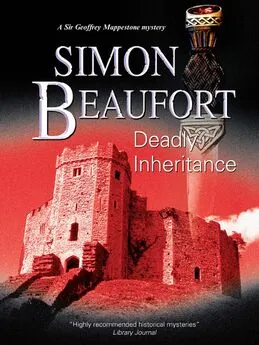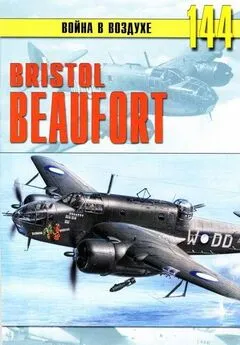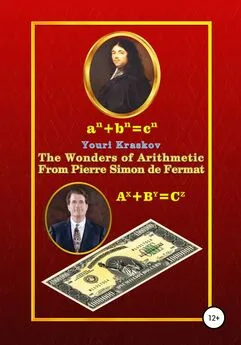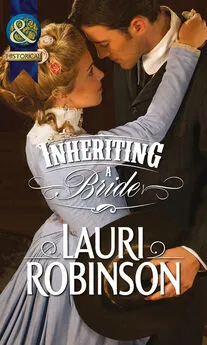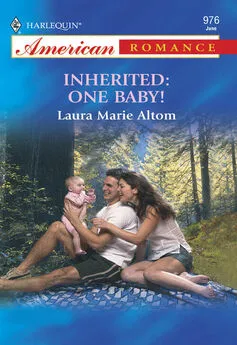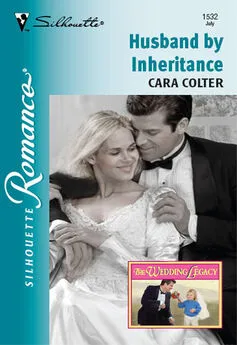Simon Beaufort - Deadly Inheritance
- Название:Deadly Inheritance
- Автор:
- Жанр:
- Издательство:неизвестно
- Год:неизвестен
- ISBN:нет данных
- Рейтинг:
- Избранное:Добавить в избранное
-
Отзывы:
-
Ваша оценка:
Simon Beaufort - Deadly Inheritance краткое содержание
Deadly Inheritance - читать онлайн бесплатно полную версию (весь текст целиком)
Интервал:
Закладка:
Geoffrey watched his diminutive brother-in-law. ‘Did I tell you about the dagger?’ He saw the reaction he had expected and felt a twinge of satisfaction tempered with unease.
‘What dagger?’ asked Joan, concentrating on her sewing.
‘I hardly think daggers are a subject to discuss before we retire,’ said Olivier primly.
‘The dagger that killed Henry,’ said Geoffrey to Joan. His discussion with Durand had helped him clarify more than Baderon’s involvement in Henry’s death, and he felt it was time to put some of his suppositions to the test. Olivier regarded him with wary eyes.
‘What about it?’ asked Joan, squinting at her work.
‘It had a ruby,’ said Geoffrey, still looking at Olivier. ‘The one Father Adrian sold in Rosse – that had been under his altar these last three months – had an emerald.’
Joan was puzzled. ‘But the dagger we found in Henry had a red stone.’ Suddenly, her hands flew to her mouth, and she gazed at her husband in horror. ‘Oh, no! Once I had made up my mind to get rid of it, I wanted it gone as soon as possible. I opened the chest and took out the cloth without looking inside. Oh, Olivier! I gave Father Adrian the dagger you inherited from your father. That had an emerald in the hilt.’
She looked stricken, but Geoffrey did not think she should be. ‘It was not a mistake. You took the right cloth to Adrian.’
She looked at him, then turned back to Olivier, who would not meet her eyes. ‘I do not understand.’
‘I exchanged them,’ said Olivier in a low voice. ‘I did not think you would notice. I tore Adrian’s holy cloth in half, and put the ruby dagger in one part and my emerald knife in the other. I left the green knife behind and removed the red one.’
‘But why?’ asked Joan, bewildered.
‘You kept a suicide weapon in our bedchamber,’ said Olivier with a shudder. ‘It was evil, tainted, and I hated having it near us. I did not want the servants accused of stealing if I removed it, nor did I want you to think me a weakling for itching for it to be gone. So I substituted my father’s for the real one.’
‘And, a few weeks later, Joan donated the false one to Father Adrian,’ concluded Geoffrey. ‘By then, it was too late to exchange them, or you would have done so. So what did you do with the red one?’
‘It was cursed,’ said Olivier in a whisper. ‘I did not want it near my wife.’
‘I understand that,’ said Geoffrey impatiently. ‘But where-’
‘You do not understand!’ cried Olivier, uncharacteristically irate. Geoffrey was startled: Olivier had never shouted at him before. ‘I mean it was cursed . Literally. By a witch.’
‘Eleanor?’
Olivier nodded. ‘I heard her. My horse threw me when I was out riding one day, and I was looking for it when I stumbled across her. Because I was embarrassed about losing my mount, I decided to hide until she had gone. She knelt at the Angel Springs and uttered incantations.’
‘Over the ruby-hilted dagger?’ asked Geoffrey.
Olivier nodded again. ‘She dripped blood over it while she spoke some diabolical language.’
‘A Black Knife,’ said Geoffrey, recalling what Torva and Jervil had told him.
Olivier took a hearty gulp of wine and continued in a shaky voice. ‘Quite so: a Black Knife. I was curious, so when she had gone I crept forward and had a look. There was a dead frog with it, and blood everywhere. I ran for my life.’
‘You were afraid of a dead frog?’ asked Geoffrey incredulously.
‘It was more than that!’ cried Olivier. ‘You have not been to the Angel Springs, or you would not say such things. While she was muttering, there was a wind . . .’ He faltered, and Joan hugged him.
‘Olivier and I have few dealings with witchcraft,’ she said quietly. ‘It is to his credit that he was frightened by what he saw.’
‘Not frightened,’ objected Olivier with as much dignity as he could muster. ‘Unsettled. And that is why I did not want that ruby knife in our bedchamber. I sensed it was dangerous – especially after Henry killed himself with it.’
‘Did you know there are dead birds hanging in our stables?’ asked Geoffrey. ‘In the stall where Henry died. There is blood, too – his, I suspect.’
Both seemed surprised. ‘I ordered the place cleaned,’ Joan said. ‘But I never checked to see if it was done.’
‘The stables unnerve me, too,’ acknowledged Olivier. ‘Ever since Henry. But I will order it all removed tomorrow. I expect the servants bought counter-spells to ward off Henry’s restless spirit.’
‘Who collected the Black Knife from the Angel Springs?’ Geoffrey asked, noting the way Olivier would still not meet his eyes – the little knight had known about the dead birds and condoned their presence, although he would not admit it in front of Joan.
Olivier shrugged. ‘The next time I saw it, it was in Henry’s corpse.’
‘So, that is why you were so shocked at finding the body!’ said Joan. ‘You had seen the dagger before and knew it was cursed. I wondered why you were so horrified. Why did you not tell me?’
‘It did not show me in a good light,’ said Olivier stiffly. ‘I had abandoned an evil thing in the forest, and it killed your brother.’
‘What happened after you took it from your bedchamber?’ asked Geoffrey.
‘I did what I should have done the first time. I destroyed it – not long after Henry’s death, we rode to Bicanofre, and on the way I dropped it in the ford.’
‘You did dally by the river,’ recalled Joan. ‘I assumed you were nervous about going to confront a possible murderer.’
‘Did you think it might be Ralph, then?’ asked Geoffrey.
Joan shrugged. ‘He and Henry had argued the day Henry died. But speaking to him was a formality at the time, because I believed Henry had been killed by Bristol merchants. When I finally learnt he had not, there seemed no point in stirring up the matter.’
‘Henry was a vile man,’ said Olivier vehemently. ‘Not worth the trouble.’
‘He broke Olivier’s arm,’ elaborated Joan. ‘I was not there when it happened, or a Black Knife would not have been necessary.’
‘He did not break it,’ argued Olivier. ‘It was bruised. And I could have bested him, but he was drunk and imbued with a diabolical strength.’
Geoffrey sincerely doubted Olivier could have done anything of the sort. Henry was strong and had been trained to fight, while Olivier was better with military theory than its practice.
‘So, you see?’ said Joan. ‘It is better to let the matter lie. Henry did so much harm that I cannot find it in my heart to condemn his killer. That is between the culprit and God.’
‘It was premeditated,’ pressed Geoffrey. ‘Someone was so determined to have Henry dead that he asked Eleanor to provide a charmed knife.’
‘You still do not see!’ cried Olivier, agitated. ‘There was no murder: the Black Knife found its way to Henry, because that is what such things do. Then he used it to kill himself. Eleanor is guilty of issuing the curse, but that is all. Henry killed himself !’
‘Jervil heard someone talking to him,’ insisted Geoffrey.
‘Jervil heard Henry, and assumed someone was with him,’ corrected Olivier. ‘Henry was drunk – talking to himself. He was doubtless stricken by his sins, and was trying to make a confession.’
‘I was told he was cursing,’ said Geoffrey.
Olivier smiled without humour. ‘That was a tale Jervil invented when pressed for details. Any sensible person will tell you his story became more elaborate each time. Unfortunately, now he is dead, you cannot demand the truth.’
Later that night, not ready for sleep, Geoffrey prowled the hall, drawing uneasy glances from the servants. The torchlight was too poor for reading, and he could not concentrate anyway. He was tempted to seek out Roger and Helbye, but suspected they would be intoxicated, and there was nothing more tedious than being sober with drunkards. Meanwhile, Olivier and Joan had retired early, so were unavailable for conversation.
Geoffrey saw Torva playing dice with the cook and his assistant. They scrambled to their feet when he approached, but he smiled to reassure them and gestured for them to sit. They did so reluctantly, and he became aware that the hall was very quiet. Everyone was pretending to be absorbed in some task, but all were paying attention.
Geoffrey studied the dice players carefully. Peter the cook was large, fat and oily and wore an apron thick with grease, while Torva’s pinched features reminded Geoffrey of a rat. Peter’s assistant, Ynys, was thick set and fair-headed. The eyes of all three were wary, and Geoffrey recalled how Father Adrian had described Jerosolimitani . He also remembered that Henry had assaulted Torva, Peter and Jervil on the night he died. He dropped to one knee and indicated he wanted to join their game, hoping to put them at their ease.
‘What will you bet?’ asked Peter, alarmed. ‘We do not have silver.’
Geoffrey revealed a handful of raisins, part of a gift he had brought Joan from his travels. She adored them, although he thought there was little nastier than a raisin.
‘And there are plenty more where these came from,’ he said confidently, intending it as a joke.
No one smiled, and he was startled to see they had taken him seriously.
‘High stakes, then,’ murmured Torva, regarding the raisins with some trepidation.
Peter took a deep breath and looked Geoffrey straight in the eye – the first time he had done so. ‘In that case I wager fifty dried peas against ten of your raisins.’
He bent his head to concentrate, and they played in silence, except for the statements necessary for the game. Geoffrey soon had a pile of peas and a horseshoe to add to his fruit, and Torva was becoming exasperated by a run of bad luck. It was difficult to cheat with their dice, so Geoffrey could not even lose to win their trust. As his winnings mounted, he realized that he was giving them even more cause to resent him.
‘Six raisins for these peas,’ said Torva, with such a serious expression that Geoffrey was tempted to laugh. He suspected it would be a mistake. The entire hall was now watching, and the atmosphere was tense. People stood close behind, hemming him in, and it occurred to him that his brother might have been caught in a similar situation – surrounded by hostile minions who wanted him dead.
Ynys leant forward as Geoffrey tossed the dice, and his sheathed dagger pressed into the knight’s shoulder. Someone else took a step closer, too, pushing Geoffrey off balance, so he was obliged to use his hands to steady himself. He wished he had not dispensed with his armour. He had a knife, but so did virtually everyone else, and he could not hope to fight them all. He began to think that he had made a foolish mistake. Ynys moved forward again, and the pressure of the weapon against Geoffrey’s shoulder became painful. Was this what had happened to Henry? Stabbed in the hall, then carried to the stable? He rested his right hand on his thigh, ready to draw his knife if he detected a hostile move.
‘Move back!’ shouted Torva, when he saw Geoffrey shoved again. ‘You are putting him off.’
There was an instant relief in the press around Geoffrey’s back, and he felt a little easier.
‘But I cannot see,’ objected Ynys. He stepped forward again, and this time the dagger jabbed hard enough to hurt. Geoffrey was unable to suppress a wince.
‘Ynys!’ snapped Peter. ‘Watch what you are doing! If you damage his new tunic, Lady Joan will be vexed.’ Ynys stepped back smartly, and Peter addressed Geoffrey in a softer voice. ‘What will you wager?’
Читать дальшеИнтервал:
Закладка:
